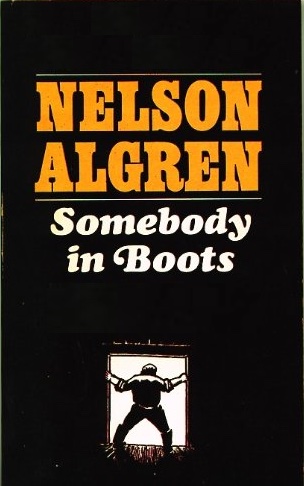Somebody in Boots
by Nelson Algren
Reviewed by Ed Lengel

Somebody in Boots, by Nelson Algren. Originally published 1935.
Born in Detroit, growing up in Chicago, and living much of his life in New York, Nelson Algren (1909-1981) is remembered today as a chronicler of America’s urban dark side, or, as one of his admirers characterized him, a “bard of the down-and-outer.” His novels Never Come Morning (1942), and The Man with the Golden Arm (1949) are set in Chicago. Many of Algren’s other pieces and short stories are set in the Depression-era south, including A Walk on the Wild Side (1956) and Somebody in Boots, his first novel, published in 1935. Each featured drifting Texans who experienced hardships and pursued scarce opportunities across the United States.
Somebody in Boots was a flop. Written, as Algren admitted, to capitalize on public concern about the Depression, and interest in political ideas such as socialism and communism, it failed to touch the chord that would make John Steinbeck a household name with The Grapes of Wrath (1939). Algren considered his book—which sold only 750 copies in its first printing, so worthless that he opposed another release, saying that it was an “uneven novel written by an uneven man in the most uneven of American times.” Yet there is a tremendous authenticity to the novel that makes it well worth reading and considering, now.
Cass McKay, the main character in Somebody in Boots, lives in poverty in west Texas with his father, brother, and sister, all of whom have to scrounge to eke out their daily existences. Cass doesn’t abandon this world because he is a good man in awful circumstances, or an idealist seeking a better life. Driven out of his home by violence and forced to wander across Texas to New Orleans and eventually to Chicago, he is a creature of the world he inhabits: ignorant, brutish, and alcoholic.
During his journeys, Cass witnesses, and is victimized by, the savage realities of everyday life for those at the bottom rungs of society. Savage beatings, rape, racism, alcohol and drug abuse, untreated disease and illness, are all part of his everyday existence. So is incarceration. The title, Somebody in Boots, describes a person of authority—in the novel, the Judge—who wears boots—and dispenses “justice” upon those who are too poor for shoes, let alone anything so exalted as cowboy boots. All of this has its impact on Cass, who as he arrives in Chicago at the novel’s end during the 1933-1934 World’s Fair—an ironic counterpoint to the world through which he has passed—has become part of that world, a criminal. As a part of that new identity, he will not only witness injustice but inflict it upon others.
As for most of his works, fiction and nonfiction, Algren based Somebody in Boots on his experiences. Two years before the novel’s publication, at the age of twenty-four with a bachelor’s degree in journalism in hand, Algren wandered down to the small town of Alpine in remote southwestern Texas, worked at a gas station, and wrote a short story. Neither prosperous nor impoverished, he committed a crime of opportunity by stealing a typewriter from a local college and fleeing town. His getaway failed and he was hauled back to Alpine and thrown into a bleak prison for five months. The experience embittered the young author, who now felt at one with the downtrodden and angry at authority. This point of view fueled his attitude towards Somebody in Boots and many of his later works as well.
Algren’s first novel was deeply political—handedly so. Each chapter is prefaced by a quote from Karl Marx’s Communist Manifesto, and at some points in the text he digresses into angry, young-man’s diatribes. Algren later admitted that he had little understanding of politics, let alone Communism. With hindsight, in fact, his perspective is self-evidently that of a Yankee urban intellectual: disgusted and horrified about the lives of the poor in the deep South, outraged that his crime—committed more out of insouciance than need—has forced him, however briefly, to share the hardships of the poor, but also adopting a sense of common identity—and thus empowerment—to speak out on behalf of the poor. Algren’s awkwardness in melding literature and politics in his first novel later embarrassed him.
With the passage of time, Algren would become more adept at integrating his political ideas into his writing. And yet, again by his own admission, his politics were casual and never well-formed. Although his touch became lighter, it was never didactic or based on study or theory. Unfiltered by practice and maturity, Somebody in Boots represents the reflexive, passionate cry of the young against injustice at a time when oppression and inequality weighed far more heavily on everyday people than it does today. It expresses clear observation—for Algren was a keen observer who integrated real sights, people, and even conversations into his writing—and the age-old urge of the young to change the world.
Ed Lengel is an author, a speaker, and a storyteller.




